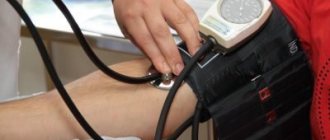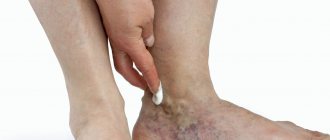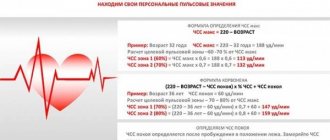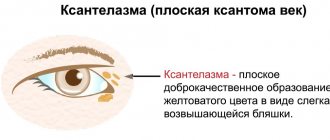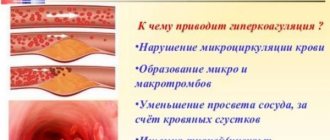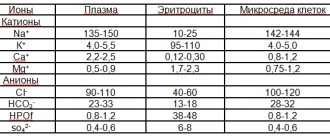DlyaSerdca → Symptoms and treatment → Feeling of heaviness in the heart area - is it dangerous?
Heaviness in the heart, discomfort in the chest and difficulty breathing are alarming symptoms that worry many. In most cases, people are guilty of cardiovascular diseases, but this is not always the case.
For example, coronary heart disease is often confused with diseases of the digestive tract or thoracic radiculitis, which manifest as heaviness on the heart.
How to identify the cause, what to pay attention to, and which specialist to contact will be discussed further.
Heaviness on the right
Various pathologies make breathing difficult and cause discomfort on the right side of the chest. Diagnostic tests will help doctors find the cause:
If you feel heaviness in your heart when you raise your right hand, then this is a neurological disorder (panic attacks, thoracalgia).- In order to analyze the heart rhythm, an electrocardiogram or echocardiography is prescribed. Increased myocardial contractions indicate heart disease.
- If there is compression or pressure in the chest area, X-ray examinations should be performed, as there is a risk of neoplasms in the mediastinum or lung pathology. This is especially true for patients with a productive cough and elevated body temperature.
If pressure occurs after eating, then there are problems with the digestive tract. Gastroscopy and biochemical blood tests are prescribed to determine the level of amylase, biurbin, etc.
- If symptoms appear at the time of swallowing, then laryngitis is suspected. To confirm the diagnosis, it is necessary to undergo an examination by an otolaryngologist. To detect sinusitis, radiography is prescribed.
- Injuries to the chest or ribs cause pressure on the right side of the chest and difficulty breathing.
These are the most common causes of tightness and pressure in the right side of the chest, but there are many others.
In order to identify the true cause of the disease, you need to undergo a medical examination.
Difficulty breathing and rapid heartbeat
- 1 Provoking reasons
- 2 Why are heavy breathing and heart palpitations dangerous?
- 3 Other symptoms
- 4 Diagnostics
- 5 How to treat? 5.1 Symptomatic
- 5.2 With VSD complex
- 5.3 For heart pathologies
Many people experienced disturbances in the form of a strong heartbeat and a feeling that it was difficult to breathe. This can happen in absolutely healthy people during severe physical exertion or emotional stress. This condition is the response of the cardiovascular system to various loads. If this condition recurs too often and without significant physical or emotional stress, then it is necessary to undergo a full range of medical examinations so as not to miss the symptoms of a terrible disease.
Provoking reasons
The reasons that cause palpitations and shortness of breath are as follows:
on
- excessive physical activity;
- severe overexcitation;
- intense emotional situations;
- lack of nutrition;
- endocrine pathologies;
- menopause;
- dehydration;
- CVD diseases;
- uncontrolled use of medications;
- excessive consumption of energy tonics.
A rapid heartbeat, when it is difficult to breathe, can be a consequence of strenuous physical work. The heart rate after intense physical labor quickly returns to normal after a short rest. It becomes difficult to breathe after emotional shock, when the pulse quickens. It is enough to normalize the work and rest schedule, avoid psycho-emotional disorders, and the condition will stabilize.
Rapid heartbeat and difficulty breathing at rest can be caused by:
- IHD;
- heart failure;
- heart attack;
- tachyarrhythmia;
- stroke;
- an attack of bronchial asthma;
- panic attack;
- pregnancy;
- poisoning;
- high blood loss.
In the above situations, you will need the help of a highly qualified doctor or an ambulance call.
Return to contents
What are the dangers of heavy breathing and rapid heartbeat?
Impaired breathing and rapid heartbeat can lead to loss of consciousness.
Rapid heartbeat and heavy breathing may be symptoms of the following conditions:
- heart attack or stroke;
- acute heart failure;
- loss of consciousness;
- thromboembolism;
- pulmonary edema;
- seizures
Return to contents
Other symptoms
A pathological condition can be suspected when tachycardia occurs systematically and without cause. Palpitations syndrome is a side effect of various pathological conditions. Tachycardia is often combined with the following symptoms:
- headache;
- general weakness;
- nausea;
- dyspnea;
- dizziness;
- fainting;
- blood loss.
Return to contents
Diagnostics
A local therapist will help you find out the reason for your high heart rate and why it’s difficult to breathe. Consultations with narrow specialists and the following types of studies may be prescribed:
- blood and urine tests;
- hormonal tests;
- blood biochemistry;
- immunological indicators;
- radiography;
- ECG;
- Ultrasound diagnostics;
- ECHO monitoring;
- electrophysiological examinations.
Return to contents
How to treat?
A cool compress will help relieve tension and pain.
Before starting treatment, it is necessary to determine the cause of the discomfort-causing symptoms. At home, you can use the following methods to reduce your heart rate:
- stop physical activities;
- ensure a flow of fresh air into the room;
- apply a cool compress to your forehead;
- calm the patient and give him the opportunity to relax;
- breathe deeply, inhaling quickly and exhaling slowly;
- hold your breath and tense your abdominal muscles;
- take soothing drops (Corvalol containing valerian);
- if the above methods do not lead to improvement, call an ambulance.
Return to contents
Symptomatically
To reduce heart rate, doctors prescribe medications of 2 groups. The medications are taken in a strictly prescribed dosage, determined by the doctor. A brief description of these medications is given in the table:
Group
Action
Titles
| Antiarrhythmic drugs | Normalize heartbeat and prevent attacks of tachycardia |
|
| Sedatives | Effective in case of palpitations caused by a disorder of the nervous system |
|
Return to contents
With VSD complex
To prevent VSD, it is important to adhere to a healthy, fulfilling lifestyle.
Strong heartbeat and difficulty breathing are symptoms of VSD. A neurologist treats this pathological condition. Therapeutic measures include:
- adherence to daily routine;
- healthy sleep;
- balanced diet;
- feasible physical activity;
- correction of stress loads;
- auto-trainings;
- relaxation techniques;
- physiotherapeutic procedures.
There are 2 forms of VSD - hypertonic and hypotonic. Both forms are characterized by an accelerated heartbeat and difficulty breathing. Despite the similarity of symptoms, various medications are used to treat these conditions, which are listed in the table:
Form
Medications
| Hypertensive | Tinctures of motherwort, valerian. Sedatives, antidepressants, nootropics (normalizing brain function). |
| Hypotonic | Tinctures of lemongrass and ginseng. Antidepressants, nootropics, tranquilizers (sedatives). |
Return to contents
Heaviness on the left
Causes of heaviness and pain in the chest area on the left side:
- Pathological expansion of the aorta (aneurysm) is a disease in which the membranes of the vessel crack, and the flowing blood compresses the surrounding tissues. Angiography is prescribed for confirmation.
- Myocardial ischemia or necrosis is a dangerous cardiovascular disease. Symptoms: severe squeezing, pressure, difficulty breathing and panic. If pain appears, this indicates a high degree of myocardial damage.
Myocardial ischemia
- If your chest feels tight on the left side after eating, it could be a stomach ulcer. You can relieve pain with the help of an antispasmodic such as No-shpa.
- Pancreatitis also causes severe pressing pain in the chest area. Symptoms worsen after eating food.
- Diaphragmatic hernia is accompanied by shortness of breath after eating. The pathology is formed due to the displacement of the intestine into the chest cavity through the diaphragm.
Diaphragmatic hernia in a child
- Diseases of the spine with pressure on the nerve fibers also cause heaviness.
- Painful sensation in the middle of the chest
Heaviness in the heart, namely in the middle part of the chest, can occur with all of the above ailments. But we can identify a number of pathologies that are characterized by compression and pain in the center of the chest:
- Convulsive muscle contractions during physical overload, stressful conditions or neurological disorders. Relaxants (Tolperil, Mydocalm), which relax skeletal muscles, will help relieve symptoms.
- Lateral curvature of the spine (scoliosis), which puts pressure on the soft tissues of the thoracic region. In this case, osteochondral tissues and nerve fibers are often pinched. Similar symptoms are characteristic of ankylosing spondylitis, osteochondrosis and intervertebral hernia.
- If a child experiences compressive pain in the chest area, namely in the center, then it would not be superfluous to visit an otolaryngologist who will check the throat. Laryngitis, tonsils and pharyngitis often cause similar symptoms.
ENT pathologies
There can be constant pressure in the chest due to diseases associated with the respiratory system:
- chronic course of pneumonia;
- tuberculosis;
- pneumoconiosis (a consequence of long-term inhalation of dust rich in silicates, talc, asbestos and other substances);
- tumors of the left lung.
If there are problems with the lungs, the heart regularly presses. This kind of pain sometimes intensifies, sometimes subsides, but does not completely disappear. The sign has no specific character.
The pain center is the lung, but due to the fact that it is located near the heart, the patient often interprets the symptoms that appear as pain in the heart. Associated signs of the disease also appear: shortness of breath, dry or wet cough, possibly with blood.
How to proceed?
So what to do if there is heaviness in the heart? Follow these rules:
- Call an ambulance because some of the above causes can be fatal.
- Sit up, remove tight clothing, and relax.
- If you have stable angina, take a glycerol trinitrate tablet.
- Breathe evenly and try to remain calm.
There are many causes of pressing pain in the chest area, and therefore only a specialist can make a diagnosis and prescribe appropriate treatment.
Self-medication is extremely dangerous for your health!
Treatment
Therapy directly depends on the current state of health of the patient. Treatment can be carried out either at home or in a hospital setting. The important thing is that you need to fight not with a symptom, but with a disease that causes heaviness in the heart area when inhaling or exhaling.
The simplest treatment is prescribed for VSD, when only folk remedies can be used. A homemade infusion or decoction of motherwort, St. John's wort or valerian is ideal for this.
When a patient is faced with osteochondrosis, drug therapy should be carried out in combination with physiotherapy and gymnastic exercises.
Structural changes in the valves and muscle walls, when the lumen of the coronary artery sharply narrows, require surgical intervention. It involves replacing the affected valve, bypass surgery or stenting of the vessel, after which a pacemaker is installed.
If the problem is rhythm disturbance, then one or several drugs from the following groups can be used:
- sartans;
- ACE inhibitors;
- beta blockers;
- nitrates;
- calcium channel blockers.
Do I need to see a doctor?
The answer is clear - of course yes! Heaviness in the heart is a dangerous symptom of a serious illness.
It is the doctor who will help you find the cause and make an accurate diagnosis after a full examination and all the necessary tests.
The problem is multifaceted, so which doctor should you contact? Make an appointment with a therapist, who, based on your complaints, will redirect you to the right specialist. Heaviness in the heart is a good reason to undergo a full medical examination to identify the cause and timely treatment of the underlying disease.

